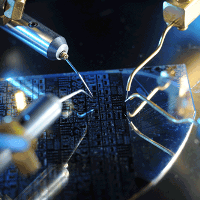

The Center for Nano Science and Technology (NDnano) has awarded 29 undergraduate research fellowships for this summer. Each student will work with a faculty-led research team and complete a 10-week project in nanoscience or nanoengineering. This is the fifth year of the program and will include students from Notre Dame, Saint Mary’s College, Ivy Tech Community College, and Purdue College of Technology. There are also several students from Ireland who will attend the program as part of the Naughton Fellowship Exchange program and three students from universities in India.
Three College of Science students are participating in the program this summer.
Dillon Bak, a rising sophomore who is physics and mathematics double major, will be working on a project titled, “Nanoelectronic material characterization using single-electron transistors.” With the shrinking of electronics towards the nanometer scale, just a few misplaced dopants can cause significant variability in the performance of electronic devices. Bak will work in the low-temperature measurement facility characterizing single-electron transistors and the defects that their characteristics reveal, as well as working in the cleanroom to fabricate devices for evaluation.
Patrick Jung, a rising senior majoring in mathematics with a life sciences concentration, will be working on a project called, “DNA origami.” Jung will work with a researcher to chemically modify a DNA oligonucleotide with a functional group that can bind to metals. If pure oligos are obtained, Jung will assemble the DNA origami in the presence and absence of metal ions and characterize them by atomic force microscopy.
Rising senior and biology major Sean McGee will be working on a project titled, “Hazard characterization and life cycle-based green redesign of a nanotechnology-enabled product.” The US National Nanotechnology Initiative has emphasized ethical, legal, and social implications (ELSI) and environmental, health, and safety issues (EHS) as nanotechnology development proceeds. Responsible development in these instances requires scientific characterization of potential harm and steps toward hazard elimination or reduction according to green design principles, which is the focus of McGee’s research project.